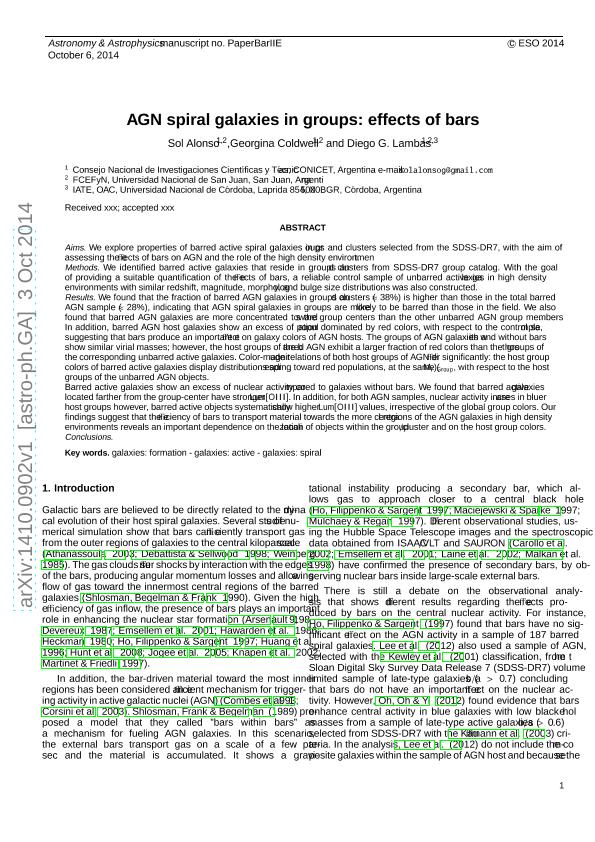Mostrar el registro sencillo del ítem
dc.contributor.author
Alonso Giraldes, Maria Sol

dc.contributor.author
Coldwell Lloveras, Georgina Vanesa

dc.contributor.author
Garcia Lambas, Diego Rodolfo

dc.date.available
2018-01-12T19:56:27Z
dc.date.issued
2014-12
dc.identifier.citation
Coldwell Lloveras, Georgina Vanesa; Alonso Giraldes, Maria Sol; Garcia Lambas, Diego Rodolfo; AGN spiral galaxies in groups: effects of bars; EDP Sciences; Astronomy and Astrophysics; 572; 12-2014; 1-10
dc.identifier.issn
0004-6361
dc.identifier.uri
http://hdl.handle.net/11336/33158
dc.description.abstract
AIMS: We explore properties of barred active spiral galaxies in groups and clusters selected from the Sloan Digital Sky Survey data release 7 (SDSS-DR7), with the aim of assessing the effects of bars on active galactic nuclei (AGN) and the role of the high density environment.
METHODS: We identified barred active galaxies that reside in groups and clusters by cross-correlating the total barred AGN sample with the SDSS-DR7 group catalog. With the goal of providing a suitable quantification of the effects of bars, a reliable control sample of unbarred active galaxies in high density environments with similar redshift, magnitude, morphology, and bulge size distributions was also constructed.
RESULTS: We found that the fraction of barred AGN galaxies in groups and clusters (≈38%) is higher than those in the total barred AGN sample (≈28%), indicating that AGN spiral galaxies in groups are more likely to be barred than those in the field. We also found that barred AGN galaxies are more concentrated towards the group centers than the other unbarred AGN group members. In addition, barred AGN host galaxies show an excess of population dominated by red colors, with respect to the control sample, suggesting that bars produce an important effect on galaxy colors of AGN hosts. The groups of AGN galaxies with and without bars show similar virial masses; however, the host groups of the barred AGN exhibit a larger fraction of red colors than the host groups of the corresponding unbarred active galaxies in the control sample. Color-magnitude relations of both host groups of AGN differ significantly: the host group colors of barred active galaxies display distributions spreading toward red populations, at the same (Mr)Group, with respect to the host groups of the unbarred AGN objects. This trend is more significant in less massive groups than in groups with MVirial> 1013.5M⊙. Barred active galaxies show an excess of nuclear activity compared to galaxies without bars in the control sample. We found that barred active galaxies located farther from the group-center have stronger Lum[OIII], while the nuclear activity in AGN galaxies without bars remain approximately constant with the group-centric distance. In addition, for both AGN samples, nuclear activity increases in bluer host groups however, barred active objects systematically show higher Lum[OIII] values, irrespective of the global group colors. Our findings suggest that the efficiency of bars to transport material towards the more central regions of the AGN galaxies in high density environments reveals an important dependence on the localization of objects within the group/cluster and on the host group colors.
dc.format
application/pdf
dc.language.iso
eng
dc.publisher
EDP Sciences

dc.rights
info:eu-repo/semantics/openAccess
dc.rights.uri
https://creativecommons.org/licenses/by-nc-nd/2.5/ar/
dc.subject
Agn Galaxies
dc.subject
Bars
dc.subject
Groups
dc.subject
Environment
dc.subject
Galaxies: Active
dc.subject
Galaxies: Spiral
dc.subject
Galaxies: Groups: General
dc.subject
Galaxies: Formation
dc.subject.classification
Astronomía

dc.subject.classification
Ciencias Físicas

dc.subject.classification
CIENCIAS NATURALES Y EXACTAS

dc.title
AGN spiral galaxies in groups: effects of bars
dc.type
info:eu-repo/semantics/article
dc.type
info:ar-repo/semantics/artículo
dc.type
info:eu-repo/semantics/publishedVersion
dc.date.updated
2018-01-03T20:10:47Z
dc.identifier.eissn
1432-0746
dc.journal.volume
572
dc.journal.pagination
1-10
dc.journal.pais
Francia

dc.journal.ciudad
París
dc.description.fil
Fil: Alonso Giraldes, Maria Sol. Universidad Nacional de San Juan. Facultad de Ciencias Exactas, Físicas y Naturales; Argentina. Consejo Nacional de Investigaciones Científicas y Técnicas; Argentina
dc.description.fil
Fil: Coldwell Lloveras, Georgina Vanesa. Universidad Nacional de San Juan. Facultad de Ciencias Exactas, Físicas y Naturales; Argentina. Consejo Nacional de Investigaciones Científicas y Técnicas; Argentina
dc.description.fil
Fil: Garcia Lambas, Diego Rodolfo. Universidad Nacional de San Juan. Facultad de Ciencias Exactas, Físicas y Naturales; Argentina. Consejo Nacional de Investigaciones Científicas y Técnicas. Centro Científico Tecnológico Conicet - Córdoba. Instituto de Astronomía Teórica y Experimental. Universidad Nacional de Córdoba. Observatorio Astronómico de Córdoba. Instituto de Astronomía Teórica y Experimental; Argentina
dc.journal.title
Astronomy and Astrophysics

dc.relation.alternativeid
info:eu-repo/semantics/altIdentifier/url/https://www.aanda.org/articles/aa/abs/2014/12/aa24523-14/aa24523-14.html
dc.relation.alternativeid
info:eu-repo/semantics/altIdentifier/url/https://arxiv.org/abs/1410.0902
Archivos asociados
